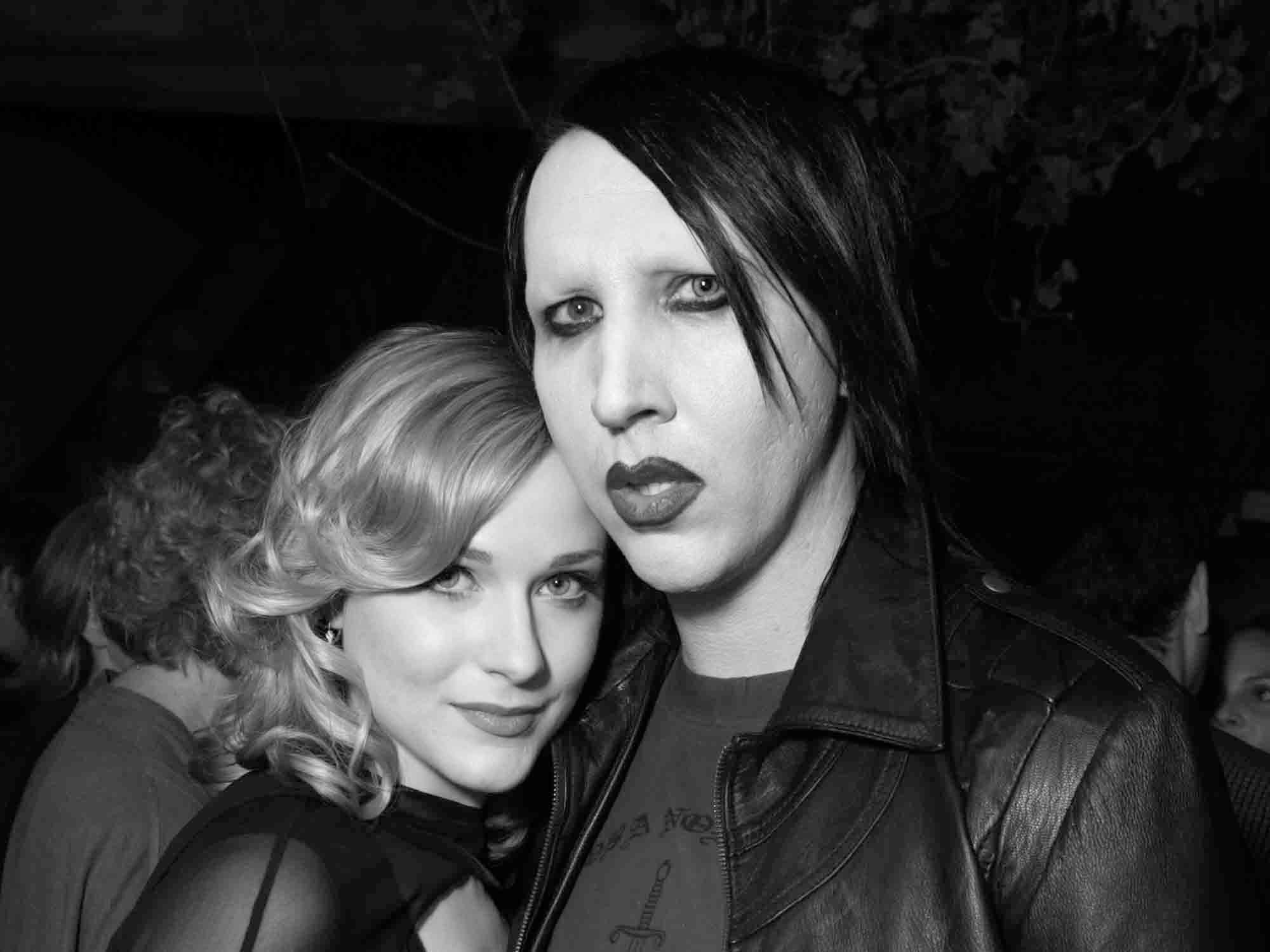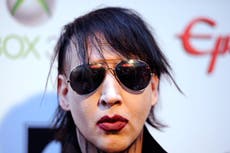Evan Rachel Wood: A timeline of her comments on abuse and assault after her Marilyn Manson allegations
Over the past five years, the Westworld star made a number of comments about an abusive relationship she went through, which are resurfacing in light of her allegations against her ex-partner, Manson

Content warning: This article contains multiple references to sexual assault and abuse that some readers may find upsetting.
Evan Rachel Wood has accused her ex-partner Marilyn Manson of grooming and abuse. For anyone who has followed the actor’s advocacy work for victims of domestic violence, these allegations will probably not come so much as a shock as an affirmation after the trail of breadcrumbs she has been leaving for almost half a decade.
On Monday (1 February), the Westworld star published a statement on Instagram, accusing Manson of grooming her and subjecting her to abuse “for years”, allegations he denies. Their relationship began in 2007, when Wood was 19 and Manson 38. They were engaged for seven months before the relationship ended.
After Wood and Manson called off their engagement in 2010, the Thirteen actor initially spoke in clipped, press-friendly soundbites about her time with Manson, choosing to frame her relationship as a coming-of-age experience (“[I] hopped on a tour bus, got engaged, went nuts. But no regrets, I would do it all again in a heartbeat. It was like life bootcamp,” she told The Guardian in 2011). Other times, as she discussed with Esquire in 2011, she’d attribute her attraction to Manson’s androgyny as a sign that she identified as bisexual.
Five years later, however, Wood – already a vocal of feminism and gender issues – began to promote what would become a career-defining role of Dolores on HBO’s Westworld, and something seemed to shift. She spoke of her ability to personally connect to her character, a humanoid AI forced to suffer unbearable cruelties, including rape and physical abuse. From there, Wood began to speak more openly about her own experience with domestic violence, even sharing her experiences with US lawmakers to prompt legislative change.
Though she never publicly accused Manson of abuse prior to 2021, many would argue that it was relatively easy to guess who she was referring to when discussing the abuse she had experienced. In 2009, Manson told Spin magazine that the day after they broke up, he called Wood 158 times. “I have fantasies every day about smashing her skull in with a sledgehammer,” he said.
In 2019, during an interview with heavy-metal publication Metal Hammer, Manson hung up on an interviewer when they asked him about Wood’s testimony to US lawmakers. “Personal testimony is just that, and we think it's inappropriate to comment on that,” his team told them in a statement. Responding to a question about Manson’s 2009 comment, his team said it was “obviously a theatrical rock star interview promoting a new record, and not a factual account”.
In the hours following Wood’s statement, more women came forward alleging a similar pattern of abuse by Manson, who was swiftly dropped from his label, Loma Vista Recordings.
“In light of today’s disturbing allegations by Evan Rachel Wood and other women naming Marilyn Manson as their abuser, Loma Vista will cease to further promote his current album, effective immediately,” the label wrote in a statement. “Due to these concerning developments, we have also decided not to work with Marilyn Manson on any future projects.”

Watch Apple TV+ free for 7 day
New subscribers only. £9.99/mo. after free trial. Plan auto-renews until cancelled.
ADVERTISEMENT. If you sign up to this service we will earn commission. This revenue helps to fund journalism across The Independent.

Watch Apple TV+ free for 7 day
New subscribers only. £9.99/mo. after free trial. Plan auto-renews until cancelled.
ADVERTISEMENT. If you sign up to this service we will earn commission. This revenue helps to fund journalism across The Independent.
Manson has now released a statement on Instagram denying the allegations. “Obviously, my life and my art have long been magnets for controversy, but these recent claims about me are horrible distortions of reality,” he wrote. “My intimate relationships have always been entirely consensual with like-minded partners. Regardless of how – and why – others are now choosing to misrepresent the past, that is the truth.”
Below, we’ve put together a timeline of Wood’s statements to the press about her first-hand experiences with domestic abuse, leading up to this week’s revelation.
November 2016: Wood describes an abusive relationship with an unnamed former partner in an interview with Rolling Stone.
During an interview to promote Westworld, Wood told a reporter that she had suffered “physical, psychological (and) sexual” abuse in the past. In an email to the reporter following her interview, she elaborated: “Yes. I’ve been raped. By a significant other while we were together. And on a separate occasion, by the owner of a bar… I don’t believe we live in a time where people can stay silent any longer. Not given the state our world is in with its blatant bigotry and sexism.”
February 2018: Wood describes her experience with domestic violence and sexual abuse for the House Judiciary Committee, as part of an effort to secure a bill of rights for sexual assault survivors in the US.
“My experience with domestic violence was this,” Wood told the House Judiciary Committee. “The toxic mental, physical, and sexual abuse which started slow but escalated over time, including threats against my life, severe gaslighting and brainwashing, waking up to the man that claimed to love me raping what he believed to be my unconscious body."
She described “sick rituals of binding me up by my hands and feet to be mentally and physically tortured until my abuser felt I had proven my love for them. In this moment, while I was tied up and being beaten, and being told unspeakable things, I truly felt like I could die, not just because my abuser said to me, 'I could kill you right now,' but because in that moment I felt like I left my body, and I was too afraid to run.”
She continued: “Not a day goes by when I don't hear the words this man whispered into my ear over and over, 'You're gonna be fine. You're gonna be fine. You're gonna be fine.' And then my small voice saying back 'No, no, no...' until it faded into nothing.
“Even though these experiences happened a decade ago, I still struggle with the aftermath. My relationship suffers, my partners suffer, my mental and physical health suffer. Seven years after my rapes – plural – I was diagnosed with long-term PTSD, which I had been living with all that time without knowledge about my condition. I simply thought I was going crazy.”
April 2018: Wood speaks to The New York Times about how her Westworld character’s journey with abuse reflects her own.
In a 2018 conversation with The New York Times, Wood described how playing Dolores “completely transformed my entire life”, because it forced her to look inward at her own history with abuse.
“Her journey mirrored so much of what I had been through and what I was going through,” she said. “It gave me a strength that I did not know I had.”
“I hadn’t even cried about my experiences until after Westworld,” she continued, describing how prior to making the series, her coping mechanism was to simply go numb. “It was like the floodgates opened,” she added. “It just felt like an exorcism; it was so painful but so healing.”
May 2019: Wood gives testimony of her domestic violence experience before the California Senate Public Safety committee.
In a disturbing and detailed account of abuse, Wood described feeling “completely trapped and terrified for my life” during testimony to the California Senate Public Safety committee, which was given in support of the Phoenix act – to extend the statute of limitations for survivors of domestic violence. The act was signed into law by governor Gavin Newsom later that year. Wood did not name her abuser.
“He gifted me a cell phone, which I found out he was monitoring,” she said. “He downloaded spyware onto my computer and hacked into my emails and social media accounts, so I could not reach out for help. When my friends and family tried to intervene, I swiftly told them to leave and that I was fine, because I was afraid of what he would do.
“He broke me down through means of starvation, sleep deprivation, and threats against my life, sometimes with deadly weapons, which would result in me having severe panic attacks where I was unable to breathe or stop shaking.
“By the time I realised I was in a bad situation, I felt completely trapped and terrified for my life.”
Wood said that if she tried to sleep, her partner would “throw things at me, or instruct me to do drugs, which would disorient me, and keep me awake, sometimes for days”.
“Once I was weakened by no sleep and little food, he would sometimes force me to partake in acts of fear, pain, torture, and humiliation, which he would videotape and which I felt powerless to stop,” she said.
October 2019: Wood discusses her goal in advocating for The Phoenix Act and describes how her abuser “had hurt a number of other women”.
“I am a domestic violence survivor,” Wood told People. “But I didn't know that I was a domestic violence survivor until many years after the events took place.”
She continued: “We create a culture of silence and shame around domestic violence. I was scared and confused about what had happened and I really blamed myself. I was ready to go to my grave with what had happened to me until I realised that the person who had hurt me had hurt a number of other women.
“I took it to an attorney and I said, ‘What can I do?’ And they said, ‘There's nothing you can do because the statute of limitations has run out on your case.’ And I said, ‘But I have evidence.’ And they said, ‘It doesn't matter.’ And I said, ‘That doesn't sound right. Something's wrong. What are my options?’ They said, ‘Well, you can try to change the law.’”
October 2019: During another interview in support of The Phoenix Act, Wood tells SELF that she’d like to name her abuser “but I can’t”.
“I didn't realise that I was being abused,” she said. “I thought that I was being strong with a complicated person. And that's kind of what was being fed to me... This person made me feel like we were going to go on this great adventure of freedom and experimentation. It was very, very far from that. It was the opposite of freedom... I want to name them, but I can't.”
October 2020: Wood speaks about channelling her “first-hand experience” with domestic abuse into activism.
“When I started being an activist, I really asked myself, where do I even start?” she said to Variety. “So the place that I usually start, because I feel like I’m going to do the most good, are the places that I have direct experience.”
“I think that’s why I’ve done so much on domestic violence, and sexual assault,” she continued. “And trying to own my white privilege and be more aware of it and do my work – you know, things that I have first-hand experience with is where I like to start. Not that I can’t do anything that I haven’t experienced. But I do feel like if I’m going to be speaking and representing something, it’s best that I know what I’m talking about.”
February 2021: Wood accuses Marilyn Manson of abuse.
On 1 February 2021, Wood posted a statement to her Instagram account accusing Manson of grooming and abuse, which allegedly began when she was a teenager.
“The name of my abuser is Brian Warner, also known to the world as Marilyn Manson,” Ms Wood wrote.
“He started grooming me when I was a teenager and horrifically abused me for years. I was brainwashed and manipulated into submission. I am done living in fear of retaliation, slander, or blackmail.
“I am here to expose this dangerous man and call out the many industries that have enabled him, before he ruins any more lives. I stand with the many victims who will no longer be silent.”
If you or someone you know is experiencing domestic abuse, you can call the 24-hour National Domestic Abuse Helpline, run by Refuge, on 0808 2000 247, or visit their website here.





Bookmark popover
Removed from bookmarks